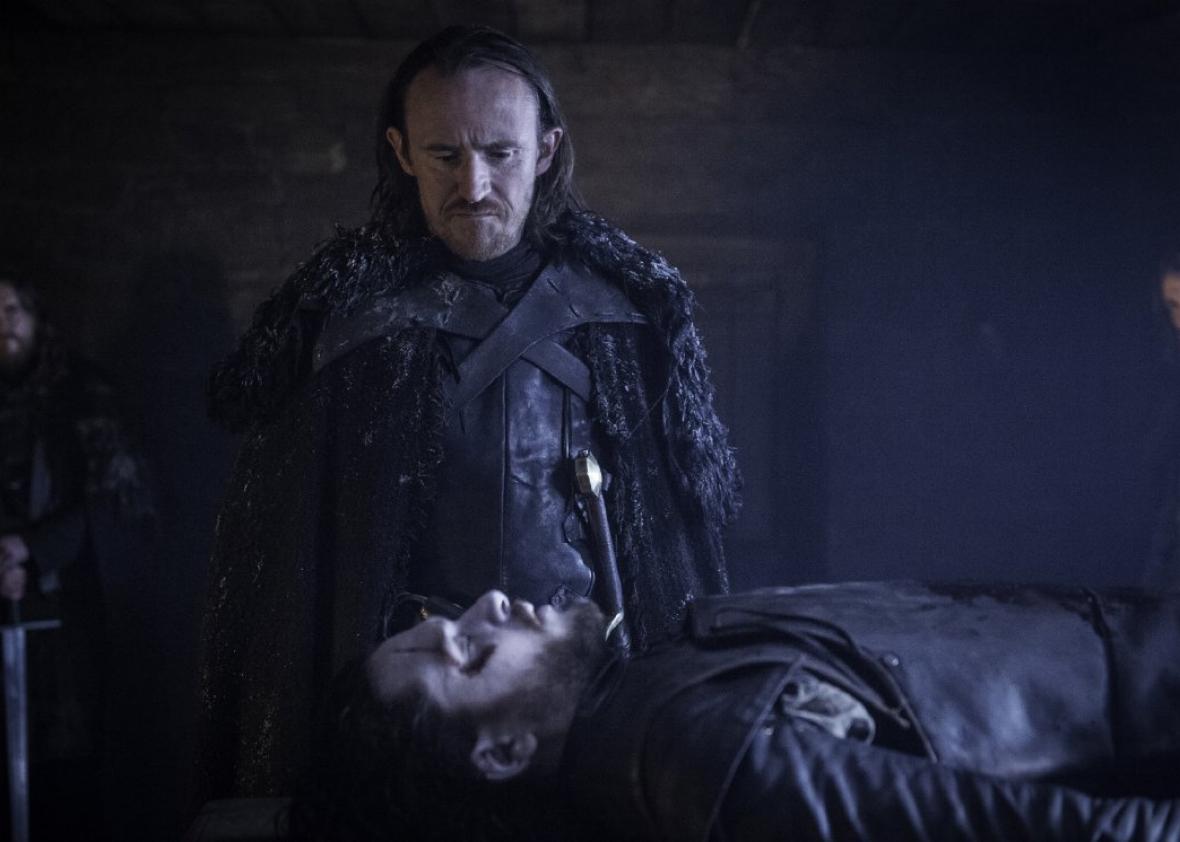The Makers of Game of Thrones Shouldn’t Apologize for Lying. They Should Lie Better.

© 2016 HBO
This post contains “surprises” about Sunday night’s episode of Game of Thrones.
It’s possible there are a few humans somewhere in the world who were surprised by Sunday’s “shocking” revelation that Game of Thrones’ Jon Snow was not, in fact, dead—or at least not permanently. But for most fans, the question wasn’t whether showrunners David Benioff and D.B. Weiss would bring back Kit Harington’s slain Lord Commander. It was how, and, to a lesser extent, when.
As it turned out, neither of those things was much of a surprise. Kit Harington’s Jon Snow came gasping back to life at the end of the sixth season’s second episode: just far enough to extend the inter-seasonal tensions but not so far that that it would try the audience’s patience. And the manner of his return seemed to fall on the border between two popular fan theories: Melisandre, the mystical “red woman,” performed a resurrection ritual, and the lingering close-ups of Jon’s direwolf, Ghost, suggested it may have have played host to his spirit while his body was otherwise incapacitated.
Just as predictable was the real-world ritual that followed. Harington, who had spent months insisting that the only way he was returning to Game of Thrones was as a corpse, taped a sheepish apology video for Entertainment Weekly, while his co-star and onscreen half-sister Sophie Turner tweeted her less tortured regrets: “Soz for the lies n that.” Benioff and Weiss have kept mum thus far, aside from a cursory episode walkthrough, but it’s only a matter of time until they do their first interview and offer fans an apology for all the times they insisted, straight-faced, that “Jon Snow is dead.”
If anything, Benioff and Weiss should apologize for not lying better. Their coy reliance on repeating the same four-word phrase guaranteed Thrones-watchers would home in on its present-tense loophole, and Melisandre’s convenient arrival at the Wall just before Jon Snow got Julius Caesared was a dead giveaway as to how matters would proceed. Keeping Harington out of sight while the season was shooting might have been a near-impossibility in the age of Instagram, but they certainly could have tried harder: When Battlestar Galactica temporarily killed off Katee Sackhoff’s Starbuck in 2007, Sackhoff went so far as to audition for other roles, even getting cast in a pilot by BSG’s David Eick. Game of Thrones’ smokescreen was comparatively thin, especially for a show where killing off major characters is par for the course.

Join our members-only TV Club to listen to spoiler-filled discussions of every episode.
Of course, by querying Benioff and Weiss about Jon Snow’s fate, fans—and, more to the point, the entertainment press—were effectively asking to be lied to. The more diplomatic response might have been to evade the question altogether or to meet it with a blunt “no comment,” but there’s no reason a storyteller should divulge the ending of a story he or she is in the middle of telling. We’ve come to expect full disclosure from creators, especially in the realm of TV, where explanatory morning-after interviews have become a standard way of extending the media penumbra: a news cycle for what happened, another for why, and perhaps one more for what happens next and what it all means. Mad Men’s Matthew Weiner was adamant about letting viewers make up their own minds, but he only lasted a few days after the show’s finale before letting us know that yes, Don wrote the Coke ad.
Game of Thrones is a show driven by plot, not ambiguous resonances. For all its mythic aspirations, it’s basically old-school pulp. But that just makes preserving the element of surprise more important. Jon Snow’s resurrection was so easy to foresee that some critics are already arguing that the show should have killed him off for real—the only truly surprising option, albeit one that would likely have thrown a serious wrench into George R.R. Martin’s planned endgame. As the show finally pulls ahead of Martin’s unfinished series, it has, for the first time, the opportunity to present book readers and show watchers alike with plot twists they never expected and to remind us that misleading your audience is one of fiction’s essential tools. There’s no surer path to surprise than lulling viewers into the false certainty they know what’s coming next, only to prove them wrong. We want to be lied to; we just don’t want to be cheated.
Read more in Slate about Game of Thrones.
